6. The Meaning of ''Everyone''
Now could I have each of you say something about the appealing features of Beat the Beat: Rhythm Paradise? Let’s start with you, Masaoka-san.
Let’s see. This time, we wanted to broaden its appeal. There is a lot of support, like showing players examples and giving demonstrations during practise, until you understand the correct rhythms. So if anyone thinks it might be a little difficult, I hope they will latch onto it this time.
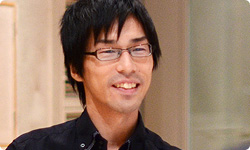
It feels great when you learn to do something that you couldn’t at first.
Yeah. It isn’t terribly difficult to simply clear it, but if you want a high or perfect score, you have to have an excellent grasp of the rhythms. There’s a lot of support in the game for that, so it’s a more considerate game than the last one.
What do you recommend, Iida-san?
During some random conversation we had at our first meeting, we talked about how there is music involved in the way children play. They call out to each other musically, like, “♪So-and-so, come out and play with us!” It’s a rhythm you don’t get tired of repeating. Beat the Beat: Rhythm Paradise has a lot like that. And I think the way you share the screen, sharing the enjoyment with those around you, is similar to how when you’re a child, you quickly join others in playing. A long time ago, after seeing the comedy group The Drifters6, I sang their humorous phrases so much that my parents got angry. An important point this time is that kind of thrilling fun. 6The Drifters: A Japanese music and comedy group.
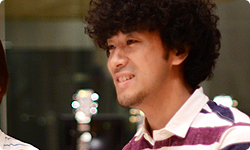
I see. It really is a fun game to watch. One of my criteria for what I consider to be a good game is that it must be fun for bystanders to watch. A lot of the video games that Nintendo has made and that have become popular were like that. “Everyone” in the Japanese title -Minna no Rhythm Tengoku, or Everyone’s Rhythm Paradise —doesn’t mean that there are four controllers and you all play simultaneously, but it’s about how everyone standing around watching one person play are holding their breath and laughing at the player’s mistakes. (laughs) The meaning of “Everyone” is that everyone enjoys it.
Oh, that’s right! Hmm, interesting.
Just like when you see someone playing with a kendama (a Japanese toy) or yo-yo, you’re like, “Let me try.”
You want to casually say, “Gimme that.” But if you want to be perfect, it requires an immense amount of perseverance. That dual nature is interesting. If someone told you to perfectly master it, you’d shrink away from it.
After some musician and drummer acquaintances of mine bought the last game, they played it through until the next evening trying to perfect their playing of the whole thing. They were being competitive, like, “We can’t let Tsunku-san beat us!” (laughs)
Then let’s have them stay up and play all night again.
(laughs)
Yone-san?
I think one attractive aspect is the return to simple button controls. The rhythms in this series are rhythms that fathers and mothers today watching their children play should have experienced when they were little. I hope that when they hear them, they will feel a connection and naturally be drawn into the game.
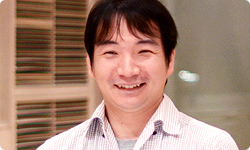
Kamada-san?
It’s a game that makes you want to stand up. When we had meetings, Tsunku-san would be playing off to one side, and beside him, Iida-san would also be getting into it. That’s how much it’s a game that everyone can get into. It would be great to see everyone standing up and getting into the rhythms.
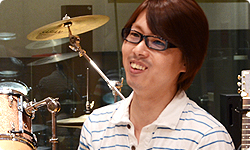
Takeuchi-san?
The game makes you laugh. It features silly little worlds that revolve around a single button.
But you made it yourself, so you shouldn’t say it’s silly! (laughs)
You can’t help grinning. (laughs) I hope everyone will share that feeling with their family and friends. I drew what I did in order to put smiles on the faces of my peers here (looking at everyone), so I hope everyone will play it and have a good laugh.
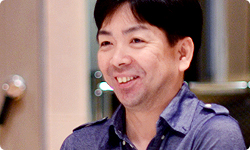
All right. Tsunku-san?
We’re talking about great things here. In trying to get music across, I teach the young people whom I produce that if you try to address everyone, that’s when you become the weakest. For example, on stage at a concert you may say something like, “This is for all you 10,000 fans!” but when you sing, it has to be one-on-one. To the person in the audience, there is just “me and you.”
Each person among the ten thousand there is mostly only aware of themselves and the performer.
Most of the time when you’re making something, though, you get in the mindset of “me versus everyone.” But that kind of song lacks power. When there are ten thousand people, the power dissipates into ten thousand pieces. It’s the same when you make a video game. It’s important to seek reactions near at hand, like “I wonder what kind of reactions my team will have when I show it to them?” and “I wonder what kind of visuals they will pair with the song I made?” One factor that fuelled us I think was because we were able to visualise the player.
You have a concrete image of the person playing.
Right. But what I really think is that rhythm is extremely important in human life and necessary for the growth of culture. A good thing about this series is that it isn’t difficult, rather it’s all ridiculously simple and doesn’t ram theory down your throat. I think it would be great if this game improves Japanese people’s sense of rhythm.
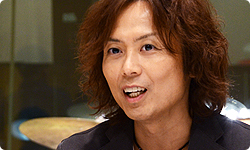
I think so, too.
I ran into a friend of mine in town the other day, and he had a child with him who was in primary school. When he said, “This is Tsunku-san who produces Morning Musume (a pop-idol group that Tsunku-san produces),” his child just made a blank expression, but when he said, “You play Rhythm Paradise, right? Well, this guys makes that game!” his child made a face like, “Wow!”
Oh! To that child, you weren’t Tsunku-san of Morning Musume, you were Tsunku-san of Rhythm Heaven.
Yeah. A look of admiration suddenly dawned across his face (laughs), as if to say, “Oh, so YOU’RE the guy who made that!” It would be a worthwhile result if this game spreads like that.
Now that we’ve made three games in the series, how much do you think you have you accomplished from among what was contained in the original project proposal?
We’ve been disseminating a sense of rhythm since about five or six years ago with this series. In a few more years, the children who have played it will grow up and then I think we will begin to see some serious results.
You feel as if you have already sown the seeds, so you should start seeing some sprouts.
That’s right. In a few years, young people from the Rhythm Paradise generation will start coming in, and it would be great if that connected to my production work. It would make things much easier if I could just say, “You know, it’s like the rhythm in that one song in Rhythm Paradise!” (laughs)
(laughs)
And if they can’t do it, you could say, “Go review it on the Game Boy Advance version!” (laughs)
I feel like what you originally proposed has come together fairly nicely. I hope it reaches lots of people and becomes a topic of conversation for them.
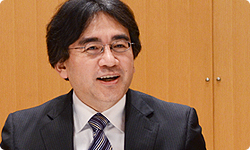
I’ll do my best.
And Nintendo will work so that more children look at you with admiring eyes! (laughs)
(laughs)
Thank you, everyone.
Thank you.